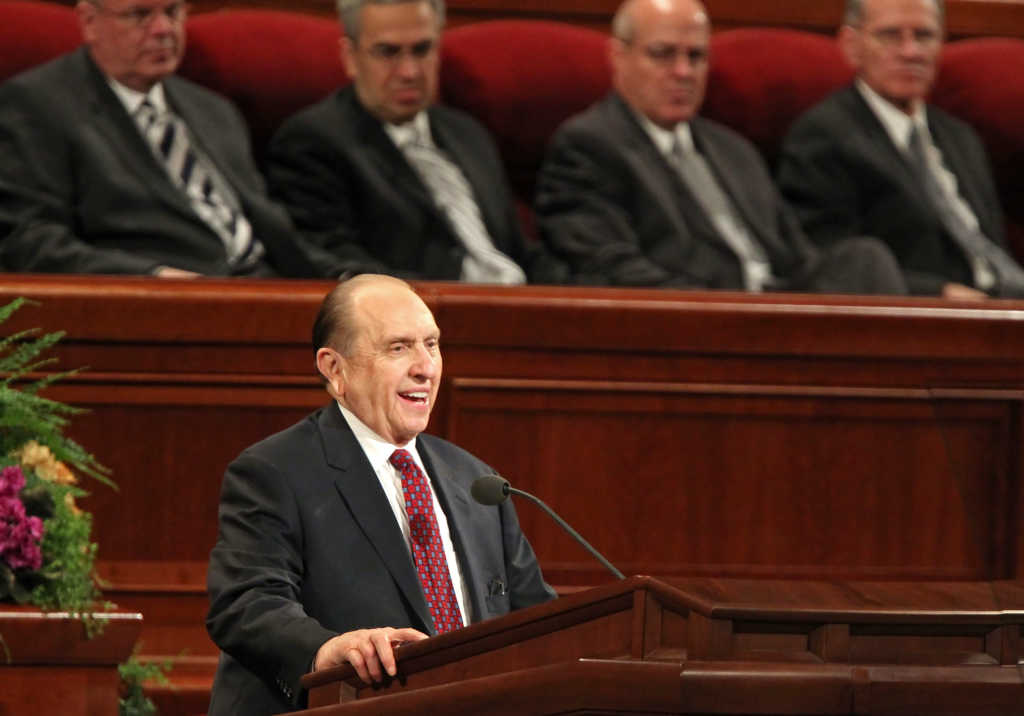Controversy over The New York Times’ handling of an obituary for Thomas S. Monson, president of the Church of Jesus Christ of Latter-day Saints, has been so rampant that the Times’ obituary editor, William McDonald, issued a response on Monday.
As Faithwire previously reported, a Jan. 3 Times tweet promoting the obituary read, “Thomas Monson, the president of the Mormon church who rebuffed demands to ordain women as priests and refused to alter church opposition to same-sex marriage, died Tuesday at 90” — a message that was seen by many as needless and insensitive.
The focus on same-sex marriage and perceived lack of female representation in the Mormon church carried over to the beginning paragraphs of the obit as well. The piece opened by noting that Monson “rebuffed demands to ordain women as priests and refused to alter church opposition to same-sex marriage.”
It also noted that he weathered “demands to recognize same-sex marriage” and “demonstrations at church headquarters by Mormon women pleading for the right to be ordained as priests.”
But despite all that, the Times reported that “Mr. Monson did not bend” and that “teachings holding homosexuality to be immoral, bans on sexual intercourse outside male-female marriages, and an all-male priesthood would remain unaltered.”
Critics reacted pretty swiftly to the obituary’s contents, with a Change.org petition urging the newspaper to rewrite the obituary gaining more than 150,000 signatures as of Tuesday morning. On Monday, amid intense debate, McDonald issued a detailed response, with the Times admitting that “readers reacted strongly” to the obituary.
“In hundreds of messages to The New York Times and dozens of comments on the obituary, readers, including many Mormons, wrote that the obituary focused too narrowly on the politics and controversies of the Mormon Church and overlooked Mr. Monson’s contributions to the community,” the Times wrote in a preface to McDonald’s Q&A.
McDonald then dove into the controversy, specifically addressing the idea that the Times focused too narrowly on Monson’s controversies and not enough on his “community and humanitarian work.” Here’s McDonald’s response:
I think the obituary was a faithful accounting of the more prominent issues that Mr. Monson encountered and dealt with publicly during his tenure. Some of these matters — the role of women in the church, the church’s policy toward homosexuality and same-sex marriage, and more — were widely publicized and discussed, and it’s our obligation as journalists, whether in an obituary or elsewhere, to fully air these issues from both sides. I think we did that, accurately portraying Mr. Monson’s positions as leader of the church, and those of the faithful and others who questioned church policies.
I think we also gave due credit to Mr. Monson’s achievements: his openness to new work by scholars of the church, “allowing them,” as we said, “remarkable access to church records”; his expansion of the church’s global missionary force and his doubling the number of young women in the missionary ranks; and his embracing humanitarian causes, often in collaboration with Jewish, Muslim and other Christian groups.
Despite all that, McDonald did concede that the obituary perhaps focused on “the public man” and not the private.
And he said that it might have been beneficial for the Times to have “paid more attention to the high regard with which he was held within the church.” McDonald said this was of course implied in the piece, but could have been stated more clearly.
“Still, on balance, I think the obituary makes clear that he was a man of strong faith and convictions, who stood by them even in the face of detractors, while finding ways to move the church forward,” he wrote.
McDonald also noted that it isn’t journalists’ role to “pay tribute” to people in their obituaries, as some might wrongly assume. You can read everything McDonald had to say about the Times’ obituary of Monson here.



